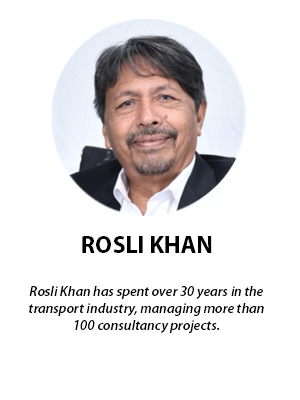FMT:
If Singapore is keen on the HSR, let them build it
Malaysia is unlikely to derive any benefit from the project.

The High-Speed Rail (HSR) link between KL and Singapore is a very ambitious project.
Estimated at about RM110 billion, it represents about 38% of our 2023 operating expenditure (RM289.1 billion), far exceeding this year’s development expenditure budget of RM99 billion.
This estimate does not take into account the cost of borrowings, interest charges, exchange rates, and other associated costs.
Negative numbers
In the case of the ECRL, another mammoth project that we do not really need, we were duped into believing that it would cost only about RM54 billion. Now we are made to understand that the actual cost far exceeds RM110 billion.
For the sake of transparency and accountability, it would be good if its project owner, Malaysian Rail Link (MRL), another company owned by the finance ministry, can confirm the cost and provide a breakdown.
In any case, my own calculations do not generate positive numbers for either project. So, I cannot see positive returns on investing in either the ECRL or the HSR, let alone both.
I think most financial analysts and readers will struggle to make the numbers stack up positively. I would be keen to see how the private sector can make the fares affordable.
My own rough calculations suggest that a return trip on HSR cannot cost less than RM1200, or RM600 each way. Even if fares were to be at that level, the payback period will simply be too long to make the project bankable.
No benefits, only outflow
From media reports it appears that the plan is for Malaysian companies to tie up with counterparts either from China or Japan to secure the necessary high-speed rail technology.
What this means is that it is very likely almost all components (rails, signalling systems, power supply, locomotives, coaches, etc.) will be imported, causing further losses in exchange rates with very little economic benefit to our domestic industries.
Indonesia is now regretting its decision to build its own high-speed rail connecting Jakarta with Bandung. Not only was the project delayed by more than five years, but as reported by South China Morning Post on June 7, it ended up costing thrice the original budget.
Furthermore, Malaysia does not boast domestic rail-based industries and components manufacturers. We do have many contractors (and middlemen), but certainly no rail industrialists unlike in India or Spain.
Like the ECRL, we are unlikely to derive any direct benefit from the project – no local contractors are likely to benefit and no local workers are likely to be used. Instead, there would be a huge outflow of funds from Malaysia.
Unlike Japan, China, South Korea, India and some European countries which have plenty of homegrown rail industries that have benefitted from similar projects, Malaysia sorely lacks capabilities in the field.
Although we have talked about this prestigious project for some 10 years now, we have not made any attempt to train and educate our youths in the sector. As a result, our abilities have remained stagnant.
No government funding, please
The HSR will no doubt make travel to Singapore easier and faster but likely at fares that are beyond the paying capacity of the average Malaysian.
That means that the project will likely only benefit the T20 group.
The project will also impact KLIA, which will suffer from reduced traffic if rail makes it convenient for travellers to head directly to Changi for onward flights.
That makes any government funding for the project unwise.
Singapore, on the other hand, appears to be keen on the HSR. If so, why not just let them undertake the project on our behalf? They can plan and build it themselves.
They can also lead and invest in any way that suits them, leaving the Malaysian government with no responsibilities except to facilitate the project.
Would that not make more sense?
Moneyed thinking!
ReplyDeleteU want development, especially those rural areas, then there must be easy accessibility.
HSR might not connecting these rural areas directly but they would definitely share many of the spillover commercial activities.
The recent explosive popularity of the 村BA/村超 in the rural 贵州 of China have brought unexpected vibrant economic activities to all the small villages surrounding 榕江站 where the a HSR passing through.
How many MRT/HSR in the world r making money, despite heavy govt subsidies?
In a greenie consideration, HSR is definitely more environmental friendly than airplanes.
If the bolihland govt is game enough to let the Singie fully built/operate the HSR with no hand interferences, the Singie would gladly take up the offer!
Just don't ah che ah jor later when the money starts to flow in.
"Singapore, on the other hand, appears to be keen on the HSR. If so, why not just let them undertake the project on our behalf? They can plan and build it themselves"
ReplyDeleteComment: I doubt if Singapore is all that keen about the HSR. I believe Singapore was not the first to propose the HSR in the first instance.
Remember, Singapore was quite happy to cancel the project and collect the penalty of S$100 mil although I think Singapore spent a bigger amount in connection with the HSR.
I doubt if the S$100 mil fully compensated Singapore.
Wakakaka…
DeleteYr doubt?
Have u read the reports of the singie transport minister when the then bolihland PM - Muhyiddin cancelled the HSR linking S'pore & KL on Jan 1, 2021?